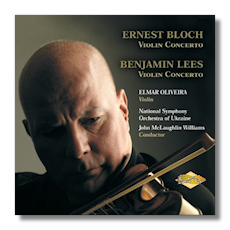
The Internet's Premier Classical Music Source
Related Links
-
Bloch Reviews
Lees Reviews - Latest Reviews
- More Reviews
-
By Composer
-
Collections
DVD & Blu-ray
Books
Concert Reviews
Articles/Interviews
Software
Audio
Search Amazon
Recommended Links
Site News
 CD Review
CD Review
Ernest Bloch / Benjamin Lees2>

Violin Concertos
- Ernest Bloch: Concerto for Violin (1938)
- Benjamin Lees: Concerto for Violin (1958)
Elmar Oliveira, violin
National Symphony Orchestra of Ukraine/John McLaughlin Williams
Artek AR-0042-2 2008 65:36

- Ernest Bloch: Concerto for Violin (1938)
- Benjamin Lees: Concerto for Violin (1958)
National Symphony Orchestra of Ukraine/John McLaughlin Williams
Artek AR-0042-2 2008 65:36
Benjamin Lees, in a brief program note to this 1958 concerto, says that Georges Antheil taught him the importance of a strong slow movement for the success of a composition. Here he offers us two movements "slow and lyrical in character," with the third movement "fiery and explosive." In repeated hearings over two months I have been struggling to come to terms with those "lyrical" movements and what they might convey to me expressively. Generally when music is spoken of as lyrical I tend to think it is idyllic. This music is surely not that, although there are certainly some beautiful passages. The New Harvard Dictionary of music defines "lyric" as "melodious," which is not all that helpful. What works better for me is to think of "lyrical" as meaning "songful," keeping in mind that songs can express the most complete range of feelings. What I have finally decided is that, as far as I am concerned, this concerto is elegiac. If I think of it that way, this musically and emotionally complex music, seeming to express varied moods, from reassuring comfort to troubled, agitated and impassioned angst, comes together meaningfully for me.
More objectively, the music ranges from the gently lovely to the vigorously angular, with the orchestral part carrying the brunt of the latter. The solo line is typically in strong juxaposition to the "accompaniment." Otherwise put, there is quite a lot of counterpoint, with an interesting orchestral part of significant musical importance. For instance, the second movement, after a woodwind beginning and repeated trills from the violin has growls from the bass reinforced by drumbeats and then trumpets. Later the violin plays over the horns and some quite beautiful music for, I think, muted trumpet. Near the beautiful quiet ending of the movement there is some gorgeous low flute melody. In the finale there is much staccato and a very assertive violin part.
Lees sounds like himself although, as in his first Piano Concerto, which I reviewed (Pierian 10), occasionally there is a moment reminiscent of Prokofieff. Conceivably one might even be reminded of the mood of Britten's Violin Concerto.
Recently here, I reviewed Zina Schiff's recording on Naxos of the Bloch Violin Concerto (Naxos 8.557757), with comparisons to other performances, and around the same time Steve Schwartz wrote at length from a different perspective on that recording, so I am not inclined to discuss Oliveira's recording in detail. I have not had second thoughts about what I wrote then and I still find Schiff's reading the most exciting and rhapsodic. Oliveira's seems more restrained, especially at the beginning, though it is an excellent performance, as one would expect from this fine violinist, and some passages are compelling. I will say that the recording is excellent, better than the one on Naxos. I do not recall other recordings on the Artek label, but they clearly have some very fine engineers.
Recommended for both pieces and highly recommended for the Lees.
Copyright © 2008, R. James Tobin




















